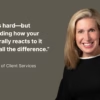
Fast forward to today: our alarm goes off, we open our eyes and BOOM, we’re hit with a feeling of dread. It’s a feeling where we can physically feel our body tense at the thought of having to face yet another day at our job.
We think to our self, “I come from a long line of [INSERT POSITION HERE]/I’ve always dreamed of a career in the [INSERT FIELD HERE]. Why am I not as successful as my colleagues seem to be? Why are they so excited by this work when all I can think is, “Great, I have to do this again?’”
Instead of blaming ourselves for not being as engaged as our colleagues, let’s stop and ask, “Am I not right for my job or is my job not right for me?”
To help answer questions like this, behavioral assessments like The Predictive Index®, can be eye opening. By looking at four primary behaviors, dominance, extroversion, patience and formality, PI® can help us to better understand what behaviors naturally drive and motivate us. PI® can also demonstrate where our natural behaviors are in line with the behaviors required for top performance and where other behaviors may not align as well with the demands of the job.
Let’s take an accounting role for example. When key stakeholders think about which behaviors are required for top performance in this type of role, they may agree that successful candidates/employees are:
- Independent
- Autonomous in problem solving
- Prefer facts and data over social interaction
- Comfortable with routine and repetitive work
- Cautious, risk-averse and “by the book”
If being in accounting is your dream job but you are naturally driven and motivated by:
- Collaborative team work
- Opportunities to influence, persuade and interact
- Variety, multitasking and change
- Flexibility, informality and spontaneity
The reality of the work and environment may be a struggle. We all adjust on a daily basis, but some adjustments are just too extreme to withstand for extended periods of time. You may need to consider other aspects that let you exercise your natural strengths either within or outside of your field. By utilizing tools like The Predictive Index®, employers can not only identify and gain agreement about which behaviors are required for top performance, but you can also gain better self-awareness around what will energize you versus what may leave you not feeling fulfilled.
To learn more about how tools like the Predictive Index® can help with self-awareness, selection, employee engagement and much more, visit mcgpartners.com.
About the Author: Erinne Tripp
About MCG Partners
MCG Partners a woman-owned, Greater Boston-based consultancy specializing in executive coaching, leadership development, talent management, and organizational development solutions. We help businesses optimize success through the entire management life-cycle. MCG Partners is also a Predictive Index® (PI®) certified partner.
To learn more about MCG Partners’ services or The Predictive Index®, contact John Griffith at john.griffith@mcgpartners.com or visit mcgpartners.com.[/fusion_text][/fusion_builder_column][/fusion_builder_row][/fusion_builder_container]








